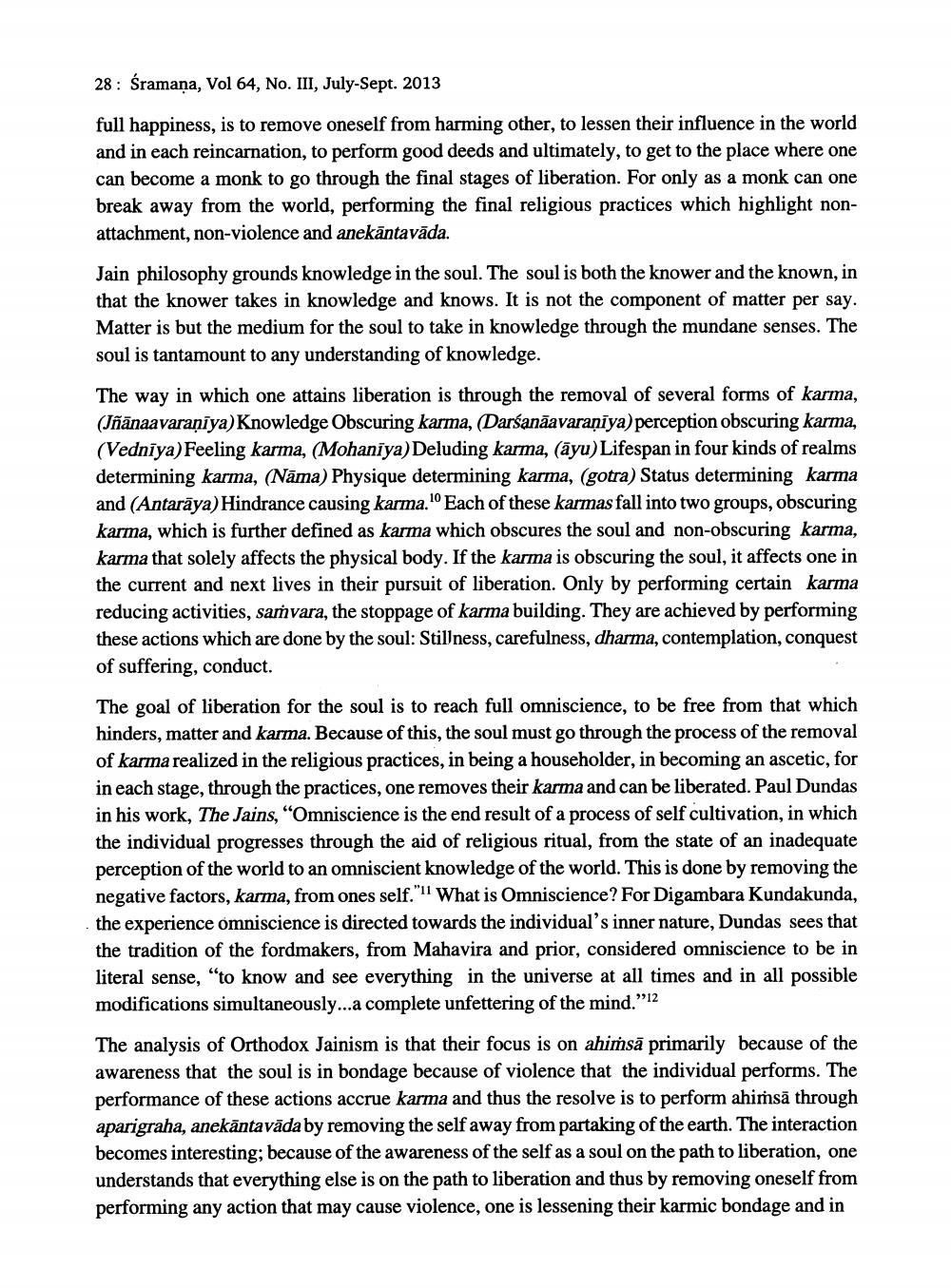________________
28 : śramana, Vol 64, No. III, July-Sept. 2013
full happiness, is to remove oneself from harming other, to lessen their influence in the world and in each reincarnation, to perform good deeds and ultimately, to get to the place where one can become a monk to go through the final stages of liberation. For only as a monk can one break away from the world, performing the final religious practices which highlight nonattachment, non-violence and anekāntavāda.
Jain philosophy grounds knowledge in the soul. The soul is both the knower and the known, in that the knower takes in knowledge and knows. It is not the component of matter per say. Matter is but the medium for the soul to take in knowledge through the mundane senses. The soul is tantamount to any understanding of knowledge. The way in which one attains liberation is through the removal of several forms of karma, (Jñānaavaranīya) Knowledge Obscuring karma, (Darśanāavaranīya) perception obscuring karma, (Vedniya) Feeling karma, (Mohaniya)Deluding karma, (āyu) Lifespan in four kinds of realms determining karma, (Nāma) Physique determining karma, (gotra) Status determining karma and (Antarāya) Hindrance causing karma. Each of these karmas fall into two groups, obscuring karma, which is further defined as karma which obscures the soul and non-obscuring karma, karma that solely affects the physical body. If the karma is obscuring the soul, it affects one in the current and next lives in their pursuit of liberation. Only by performing certain karma reducing activities, saṁvara, the stoppage of karma building. They are achieved by performing these actions which are done by the soul: Stillness, carefulness, dharma, contemplation, conquest of suffering, conduct.
The goal of liberation for the soul is to reach full omniscience, to be free from that which hinders, matter and karma. Because of this, the soul must go through the process of the removal of karma realized in the religious practices, in being a householder, in becoming an ascetic, for in each stage, through the practices, one removes their karma and can be liberated. Paul Dundas in his work, The Jains, “Omniscience is the end result of a process of self cultivation, in which the individual progresses through the aid of religious ritual, from the state of an inadequate perception of the world to an omniscient knowledge of the world. This is done by removing the negative factors, karma, from ones self.”ll What is Omniscience? For Digambara Kundakunda, the experience omniscience is directed towards the individual's inner nature, Dundas sees that the tradition of the fordmakers, from Mahavira and prior, considered omniscience to be in literal sense, "to know and see everything in the universe at all times and in all possible modifications simultaneously...a complete unfettering of the mind."'12
The analysis of Orthodox Jainism is that their focus is on ahiṁsā primarily because of the awareness that the soul is in bondage because of violence that the individual performs. The performance of these actions accrue karma and thus the resolve is to perform ahiṁsā through aparigraha, anekāntavāda by removing the self away from partaking of the earth. The interaction becomes interesting; because of the awareness of the self as a soul on the path to liberation, one understands that everything else is on the path to liberation and thus by removing oneself from performing any action that may cause violence, one is lessening their karmic bondage and in




